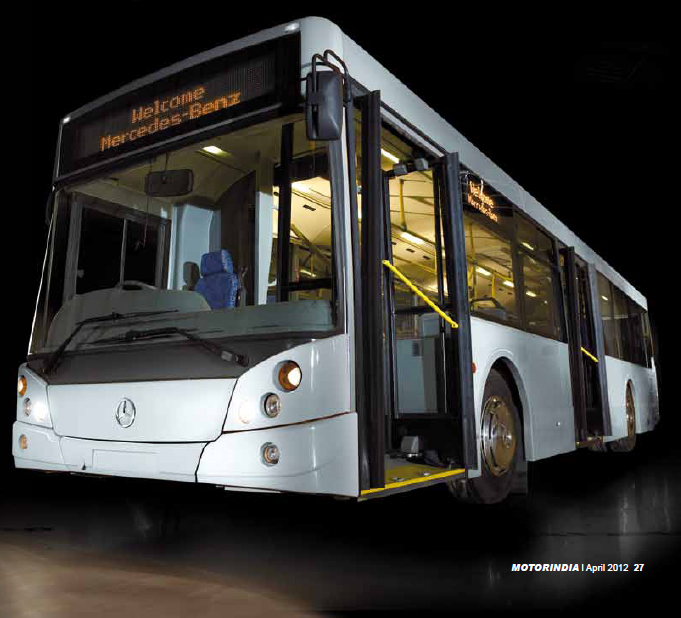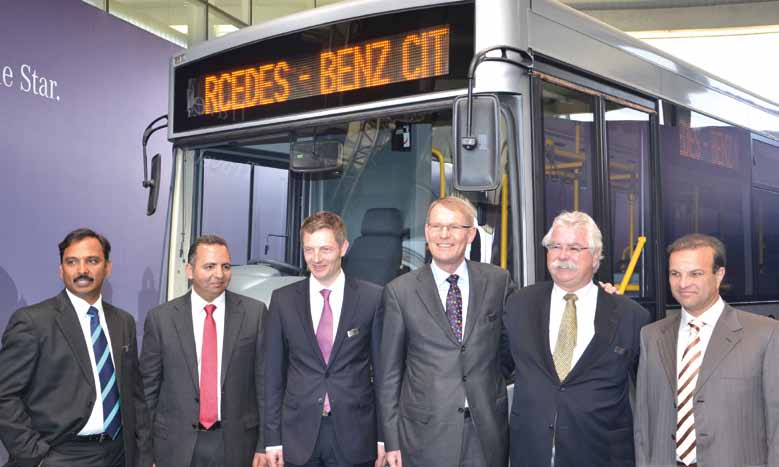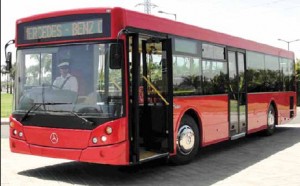 Mercedes-Benz, one of the largest bus manufacturers in the world, has introduced its low-entry City Bus for the first time in the Indian market. After its successful entry into the Indian inter-city bus segment in 2008, the company has signalled its increasing intentions for the Indian market with its latest foray into the city bus segment.
Mercedes-Benz, one of the largest bus manufacturers in the world, has introduced its low-entry City Bus for the first time in the Indian market. After its successful entry into the Indian inter-city bus segment in 2008, the company has signalled its increasing intentions for the Indian market with its latest foray into the city bus segment.
Mercedes-Benz India also announced the inauguration of its City Bus manufacturing facility in Chakan, Pune, with an annual production capacity of 900 units in two shifts. The decision to enter the city bus segment in India highlights the global leader’s commitment to the Indian market.
Speaking on the company’s focus on the Indian market, Mr. Hartmut Schick, Head of Daimler Buses, observed: “Our 2-axle and 3-axle buses have been very well received in the Indian market. Our foray into city buses will now enable more and more people to ‘Travel with the Star’. We will participate in the Indian market growth by expanding our bus business with a superior-quality low-entry city bus for the Indian market. The Mercedes-Benz City Bus we present today is hence key for Daimler Buses’ strategy for India. As the inventors of buses and one of the largest bus makers of the world, we are confident that our solutions will appeal to the demanding Indian customers.”
The Indian bus market is the second largest in the world with 46,000 units sold in 2011. Despite the impressive figure, there is still a huge untapped market potential due to the growing Indian population and the continuously increasing need for transportation, mobility and innovation.
“When it comes to strengthening public transport, the city bus is the best concept to be applied. It is easy to integrate into running traffic, without the need for major infrastructure investment as in metro or railways, and it is very flexible in operation. These advantages perfectly correspond to the impressive dynamics which the Indian society undergoes across all sectors”, added Mr. Schick.
New head for Daimler Buses India
The launch event also saw Mercedes-Benz appoint Mr. Markus Villinger as the Head of Daimler Buses India, another decision foregrounding the company’s long-term plans for India. With rich experience in commercial vehicles business with Daimler, Mr. Villinger will take over the operations and will be responsible for the overall bus business in India.

Speaking on the occasion, Mr. Markus Villinger commented: “India is a fascinating market and there is rising demand for robust, reliable and efficient city bus transportation. Our City Bus is designed to fulfil these requirements. The respect for brand Mercedes-Benz in India is legendary, and we shall try to deliver as per the expectation of our discerning customers and their passengers in India. My objective here is to ensure many enthusiastic and satisfied customers. I am extremely excited to be part of this growth story and hope that together we can realize our ambition to make more people in India ‘Travel with the Star’.”
Mercedes-Benz’s quality standards in product development are definitely benchmark and also reflect the global leader’s prowess in bus manufacturing. The company has adopted its global quality standards for the Indian market as well. “Before our product hits the market, a multi-stage development and testing process which based on interdisciplinary teamwork takes place. Every new product generation undergoes rough road testing, endurance testing along with overall performance testing and fine-tuning. For India, we have gone one step further by collecting feedback from operators and passengers alongwith trials in seven Indian cities under stringent operating conditions on regular routes and traffic”, added Mr. Villinger.
Captive body-building unit with MCV
Mercedes-Benz has also integrated a captive body-building unit in partnership with MCV within its state-of-the-art manufacturing facility in Chakan. Delighted over his company’s successful partnership with MCV, Mr. Schick said: “As a leading body manufacturer in the Middle-East, MCV is one of Daimler Buses’ most important body-building partners worldwide. Thanks to our efficient cooperation, we are able to set up an integrated production concept of chassis and body here at the Pune plant which ensures the best quality for our customers”.
The long-term business relationship between MCV and Daimler Buses commenced in 1995. Since then MCV has constructed over 15,000 bus bodies on Mercedes-Benz chassis which are successfully operating in some of the most demanding territories in the world.
Said Mr. Karim Ghabbour, MCV President: “We are fully focussed on the complete integration of our business into the Indian manufacturing infrastructure. We consider the members of the Indian supply chain as one of the most capable in the world. We have introduced Indian sourced materials and components into our purchasing programme from day one of our operations. We are currently introducing robust personnel training programme to ensure that the incoming MCV India workforce rapidly develops and maintains the skills and techniques we consider necessary to meet the high level of quality that will be required by the even more demanding market here. We will not leave any stone unturned in support of our business partner Daimler Buses as will jointly strive to meet the current and future requirements of the bus operations in India.”
MCV’s business operation is driven by strict computer-based control systems and procedures, essential to manage its annual production capacity of 6,000 units at the company’s modern factory in Egypt. Further, as the company has progressed with the establishment of MCV India, the proven practices and processes used in its factory in Egypt have been reproduced in India. “The principles of design and standard of quality applied by MCV follow the most stringent international standards, setting benchmarks of excellence in the markets we serve. Our design principles target a process of body and chassis integration which results in maximum strength with minimum weight”, added Mr. Ghabbour.

Power-packed performance
 Built with high quality components, the Mercedes-Benz City Bus is backed by stringent Mercedes-Benz quality, and at the same time it offers an unmatched economic package for the customers. “In line with Mercedes-Benz Buses’ core values – safety, quality and profitability – we have selected the O500U 1826 LE chassis for the City Bus. The chassis is performing successfully in many countries across the world, including Brazil, South Africa and Australia”, said Mr. Srinivas Chilukuri, General Manager – Buses (Sales & Marketing).
Built with high quality components, the Mercedes-Benz City Bus is backed by stringent Mercedes-Benz quality, and at the same time it offers an unmatched economic package for the customers. “In line with Mercedes-Benz Buses’ core values – safety, quality and profitability – we have selected the O500U 1826 LE chassis for the City Bus. The chassis is performing successfully in many countries across the world, including Brazil, South Africa and Australia”, said Mr. Srinivas Chilukuri, General Manager – Buses (Sales & Marketing).
The low-entry City Bus is powered by a proven and robust 7.2 litre, six-cylinder, OM 926 Diesel engine with 252 hp and 900 Nm torque which features a highly economical drive system using BlueTec diesel technology. It offers a wide choice of optional equipment making it an ideal vehicle to address the growing public transport requirements.
Commenting on the choice of automatic transmission, Mr. Srinivasan said: “Keeping in view the frequent start-stop city operation in India and with positive customer feedbacks on automatic transmission, we have opted for the technically superior and latest Voith DIWA .5 transmission in our City Bus. The transmission has an in-built hydrodynamic retarder and provides advantages such as reduced driver fatigue by eliminating manual gear-shifts, improved driving efficiency, improved passenger comfort and improved life of aggregates due to optimum gearshift in city traffic.”
The state-of-the-art air suspension of the vehicle increases passenger comfort. The excellent stability and ride comfort of the City Bus is enhanced by the Mercedes-Benz bus-type air suspension which has been well received by users of the Mercedes-Benz coaches.
The Mercedes-Benz City Bus has high fuel efficiency and is ahead of competing products with its efficient and powerful engine, an optimum weight factor, smartly developed aerodynamics and rolling resistance. The extreme ease of maintenance translates into long maintenance interval and significantly reduces the downtime, which makes the Mercedes-Benz City Bus an ideal choice for operators.
The City Bus fully complies with the bus body code, which aims at regulating the diverse Indian bus body building landscape to ensure high passenger and driver safety. With a base price of Rs. 9,000,000 (ex-factory Pune), it is the first bus to be certified with bus body code certification in India.
Loaded with features
The vehicle has a striking appearance imbibing fresh and contemporary design cue. The equally-appealing spacious interiors, combined with low-entry design, facilitate ease of entry and exit for passengers. The unique low-entry design, coupled with wheel chair ramp of the City Bus, ensures that passengers with restricted mobility can get on board without difficulty. The high comforting cushioning, multiple charging points, powerful air-conditioning and three destination boards add to the comfort and convenience of the passengers.
The City Bus is also thoughtful about driver comfort and convenience, resulting in a safer drive. The driver’s cabin is smart, ergonomic and safe with pneumatic seats. All the important switches are conveniently accessible on the panel.
With the launch of the City Bus, it would be interesting to see the developments in the Indian city bus segment. As passengers demand better quality, safety and comfort in public transportation, the city bus segment is bound to witness strong growth in the coming years for which the new Mercedes-Benz City Bus comes as a welcome option for those who wish to ‘Travel with the Star’.